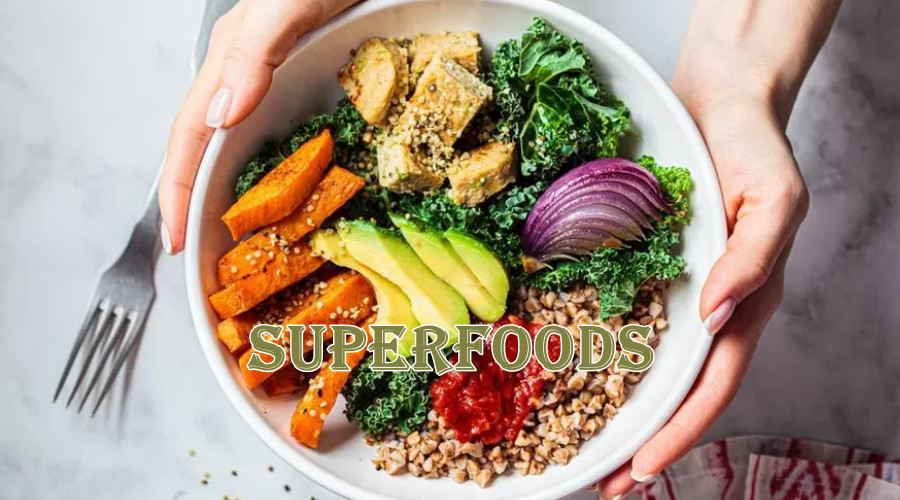
What Are Superfoods?
Superfoods are foods that are exceptionally rich in nutrients and beneficial compounds, offering significant health benefits. While there is no official definition of superfoods, they are generally recognized for their high content of vitamins, minerals, antioxidants, and other essential nutrients. These foods can help enhance your diet and support optimal health.
Top Superfoods to Include in Your Diet
1. Berries
Berries such as blueberries, strawberries, raspberries, and blackberries are packed with antioxidants, vitamins, and fiber. They are known for their anti-inflammatory properties and ability to reduce oxidative stress. Berries can improve heart health, boost brain function, and support healthy digestion.
How to Include Them: Add berries to your morning cereal, yogurt, or smoothie. Enjoy them as a snack or incorporate them into desserts and salads.
2. Leafy Greens
Leafy greens like spinach, kale, Swiss chard, and collard greens are nutritional powerhouses. They are rich in vitamins A, C, and K, as well as minerals like iron and calcium. These greens are also high in fiber and antioxidants, which help detoxify the body and support immune function.
How to Include Them: Use leafy greens in salads, smoothies, or as a base for sandwiches and wraps. Sauté them with garlic and olive oil for a quick and nutritious side dish.
3. Nuts and Seeds
Nuts and seeds, including almonds, walnuts, chia seeds, and flaxseeds, are excellent sources of healthy fats, protein, and fiber. They provide essential nutrients like vitamin E, magnesium, and omega-3 fatty acids, which are important for heart health, brain function, and reducing inflammation.
How to Include Them: Sprinkle nuts and seeds on oatmeal, yogurt, or salads. Use nut butters in smoothies or as a spread on whole-grain toast. Add seeds to baked goods for added nutrition.
4. Fatty Fish
Fatty fish such as salmon, mackerel, sardines, and trout are rich in omega-3 fatty acids, which are crucial for heart health, brain function, and reducing inflammation. These fish are also high in protein and contain essential vitamins and minerals, including vitamin D and selenium.
How to Include Them: Grill, bake, or broil fatty fish for a delicious main course. Add smoked salmon to salads, sandwiches, or omelets. Incorporate canned fish into pasta dishes or spreads.
5. Whole Grains
Whole grains like quinoa, brown rice, oats, and barley are packed with fiber, vitamins, and minerals. They help regulate blood sugar levels, support digestive health, and provide sustained energy. Whole grains also contain antioxidants and phytochemicals that protect against chronic diseases.
How to Include Them: Use whole grains as a base for salads and bowls. Enjoy oatmeal or quinoa for breakfast, and substitute whole grains for refined grains in recipes.
6. Legumes
Legumes such as beans, lentils, chickpeas, and peas are excellent sources of plant-based protein, fiber, and essential nutrients like iron, folate, and potassium. They promote digestive health, stabilize blood sugar levels, and support heart health.
How to Include Them: Add legumes to soups, stews, and salads. Use them as a base for veggie burgers or as a filling for tacos and wraps. Make hummus or bean dips for a healthy snack.
7. Green Tea
Green tea is rich in antioxidants, particularly catechins, which have powerful anti-inflammatory and cancer-fighting properties. It also contains L-theanine, an amino acid that promotes relaxation and mental clarity.
How to Include It: Enjoy green tea as a hot or iced beverage. Add a squeeze of lemon or a touch of honey for extra flavor. Use matcha powder in smoothies, lattes, or baked goods.
Tips for Incorporating Superfoods into Your Diet
- Plan Your Meals: Incorporate superfoods into your meal planning to ensure a balanced and nutrient-rich diet. Aim to include a variety of superfoods in each meal.
- Experiment with Recipes: Try new recipes that feature superfoods to keep your meals interesting and flavorful. Look for creative ways to combine superfoods for maximum benefit.
- Snack Smart: Choose superfoods as snacks to boost your nutrient intake throughout the day. Fresh fruit, nuts, seeds, and yogurt are excellent choices.
- Stay Consistent: Make superfoods a regular part of your diet to reap their long-term health benefits. Consistency is key to achieving optimal health.
Conclusion
Superfoods are a valuable addition to any diet, offering a wealth of nutrients that support overall health and well-being. By incorporating a variety of berries, leafy greens, nuts, seeds, fatty fish, whole grains, legumes, and green tea into your meals, you can enhance your nutrition and boost your health. Embrace the power of superfoods and take a proactive step toward a healthier, more vibrant life.